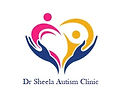Sleep Disturbances in Autism Spectrum Disorder Homeopathy Treatment in Chennai
- Dr Sheela Homeopathy Clinic Chennai
- Mar 11, 2025
- 3 min read
#sleepdisturbancesinautismspectrumdisorderhomeopathy #sleepdisturbancesinautismspectrumdisorderhomeopathyclinic #sleepdisturbancesinautismspectrumdisorderhomeopathytreatment #sleepdisturbancesinautismspectrumhomeopathydoctorinchennai #sleepdisturbancesinautismspectrumdisorderhomeopathicclinicinchennai #sleepdisturbancesinautismspectrumdisorderhomeopathictreatmentinchennai #sleepdisturbancesinautismspectrumdisorder
Understanding Sleep Disturbances in Autism Spectrum Disorder
Sleep is essential for overall health and well-being, yet many individuals with Autism Spectrum Disorder (ASD) experience significant sleep disturbances. This issue is not only prevalent but can also have a profound impact on daily functioning, behavior, and quality of life. 40% to 80% of individuals with ASD report experiencing sleep problems. This is markedly higher than the general population, where sleep disturbances affect around 30% of adults and children. Understanding the prevalence of these issues is the first step toward effective management.
Estimates suggest that up to 80% of children with autism experience sleep disturbances, with issues ranging from difficulty falling asleep to frequent awakenings throughout the night. This higher incidence of sleep problems can have far-reaching effects on a person's quality of life, impacting behavior, mood, and daily functioning.

Types of Sleep Disturbances
Insomnia: Many individuals with ASD struggle with initiating and maintaining sleep, leading to difficulties in achieving restorative rest.
Sleep Apnea: Obstructive sleep apnea is a disorder characterized by repeated interruptions in breathing during sleep. It can lead to fragmented sleep and daytime fatigue, complicating the well-being of individuals with ASD.
Circadian Rhythm Disorders: Some individuals may experience irregular sleep-wake cycles, where their sleep patterns do not align with typical societal norms. This can make morning routines and school attendance particularly challenging.
Nightmares and Night Terrors: Increased levels of anxiety, common in individuals with ASD, can lead to nightmares or night terrors, further disrupting sleep.
Hypersomnia: While less common, some individuals may experience excessive daytime sleepiness, despite sleeping the recommended hours at night.
Causes of Sleep Disturbances
Understanding the underlying causes of sleep disturbances can be instrumental in finding effective solutions. Several factors may contribute to these sleep issues:
Sensory Sensitivities: Many individuals with ASD experience heightened sensitivities to sensory stimuli, such as light, sound, or temperature, which can interfere with their ability to relax and fall asleep.
Anxiety: Anxiety disorders are frequently associated with autism. Elevated anxiety levels can lead to racing thoughts and worry at bedtime, making it harder to settle down for sleep.
Medical Issues: Comorbid medical conditions, such as gastrointestinal problems, seizures, or ADHD, can also disrupt sleep patterns.
Communication Challenges: Individuals with ASD may struggle to articulate discomfort or needs, leading to frustration and sleep disruption.

Dr. Sheela Homeopathy 9500049892
The Impact of Sleep Disturbances
Sleep disturbances can have wide-ranging effects on daily life:
· Behavioral Issues: Poor sleep can lead to increased irritability and challenging behaviors, making it difficult for individuals to engage socially and academically.
· Cognitive Function: Lack of adequate sleep can impair attention, memory, and overall cognitive performance, hindering learning and development.
· Physical Health: Chronic sleep deprivation can contribute to various health issues, including obesity and weakened immune function, underscoring the importance of addressing sleep problems.
The effects of poor sleep can be profound. When individuals with ASD don’t get adequate rest, it can lead to increased irritability, difficulties with concentration, and greater challenges in emotional regulation. Family members often bear the brunt of these challenges, experiencing stress and fatigue as they navigate nighttime issues.
Navigating sleep disturbances in Autism Spectrum Disorder can be challenging for both individuals and their families. However, understanding the unique sleep needs and challenges associated with ASD is the first step in finding effective solutions. By adopting practical strategies and fostering a supportive environment, families can work together to improve sleep quality, ultimately enhancing the quality of life for individuals with autism.
Sleep Disturbances in Autism Spectrum Disorder Children homeopathy treatment in Chennai.

FAQs about Sleep Disturbances in Autism Spectrum Disorder
1. What are common sleep disturbances in individuals with ASD?
Common sleep disturbances include difficulties falling asleep, frequent awakenings during the night, early morning awakenings, irregular sleep-wake cycles, nightmares, and sleep apnea.
2. Is it normal for children with autism to resist going to bed?
Yes, resistance to bedtime is common among children with ASD. Factors such as anxiety about separation, discomfort, or fear of the dark can contribute to this behavior.
3. When should I seek professional help for sleep disturbances?
If sleep disturbances are significantly impacting your child's daily functioning, behavior, or overall quality of life, it may be advisable to seek guidance from a healthcare provider.
4. What role does anxiety play in sleep disturbances for individuals with ASD?
Anxiety is common in individuals with ASD and can make it challenging to wind down and transition to sleep, often exacerbating sleep problems.
5. Why do individuals with ASD have sleep problems?
Factors contributing to sleep disturbances may include sensory sensitivities, anxiety, medication side effects, and disruptions in routine.



